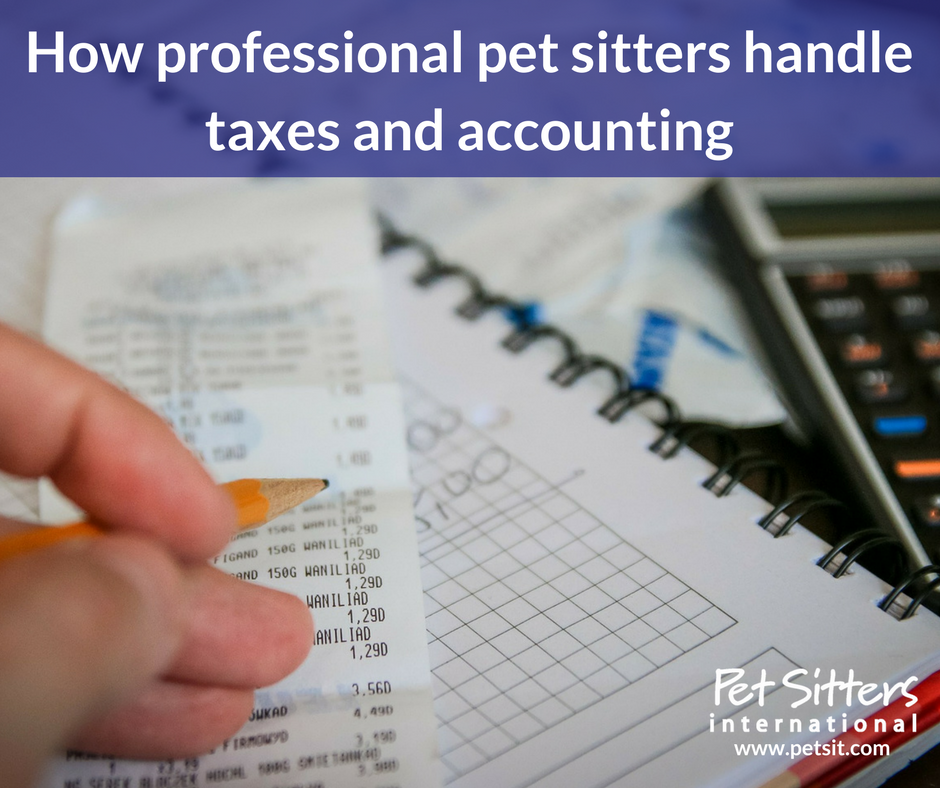How professional pet sitters handle taxes and accounting

The thing about being a professional pet-sitting business owner is that a big part of your job is being a business owner. For many, the pet sitting comes easy—from dog walks and kitty visits to continuing education in pet behavior, health and first aid—and the “pet part” is the “best part.” The other part, however, the “business part” of paperwork, documentation, scheduling, taxes and accounting is not nearly as fun for most—but equally important. Keeping on top of your accounting and understanding tax deductions for pet sitters can save you time and money!
Are pet sitters using professional accountants?
In a recent survey conducted by PSI, 48 percent of members indicated they use an accountant for their pet-sitting businesses, while 52 percent choose to handle taxes and accounting on their own.
For additional feedback, we also reached out to PSI pet sitters on the PSI Facebook page and asked:
PSI pet sitters, how do you handle your accounting? Do you use a professional accountant or do you do your own recordkeeping?
- Amy D.: An accountant is a must for me!
- Shannon P.: I tried for three months on my own. I’ve been using the same accountant for almost twelve years now. I’d be lost without her.
- Jay P.: I currently do my own because I have a previous financial background. However, my personal financial situation is getting more complex so I may seek specialized help.
- Pam G.: I used to be an accountant, so I do all of my own!
- Ann B.: I’ve done my own for ten years, but I am about to cave and hire someone. I don’t have employees, which made it so simple that I couldn’t justify paying someone to do what I could do myself.
- Tina S.: I use an accountant. I don’t do math. And, life’s too short. Plus, I like being able to help another small-business owner.
Selecting an accountant for your pet-sitting business…
When it comes to handling tax and accounting for your pet-sitting business, it’s a good idea to find an accountant to assist you with necessary recording keeping, unless your pre-pet sitting career involved bookkeeping or tax preparation.
Shop around when searching for an accountant and look for one that specializes in helping small-business owners. You should ask local pet sitters or other local small- business owners for recommendations and then interview a few accountants before making a decision.
Remember, accounting fees and expertise vary, so don’t be shy about asking for fee information, credentials and references from the accountants you meet.
An accountant will help you set up your books, do your payroll, and apply for any necessary identification numbers. An accountant can also save you some running around by supplying the forms you’ll need, such as state and federal payroll tax forms.
Although accounting procedures may at first seem overwhelming to a new business owner, a good accountant will soon have you trained and knowledgeable about the financial side of your business.
More tips from the pros…
How did you go about selecting your accountant? Are there any other taxes or accounting tips you would share with fellow pet sitters? Share your feedback in the comments section below.
Also, be sure to check out the September/October 2015 issue of Pet Sitter’s WORLD magazine for two important articles: “A Dozen Deductions for Your Pet-Sitting Business” and “Choosing a CPA for Small Businesses Taxes and Management.”







Comments
Taxplus Accountants.